Shimon Peres (Israel)
1994 Nobel Peace Prize Laureate, awarded for his efforts to reach peace in the Middle East
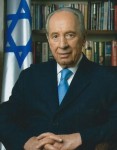
Autograph of Israel’s ex-President and Nobel Peace Prize Laureate Shimon Peres. From Private Collection
«The world divides into two parts –
friends and books»
(Shimon Peres)
An outstanding personality, wonderful politician and diplomat, Nobel Peace Prize Laureate, hero, patriot, and Israel’s pride – all of it is about Shimon Peres. Without Shimon Peres the world’s history and the history of the Nobel Peace Prize Winners would be one page short, and the night sky would miss one of its stars.
Shimon Peres was born on 2 August 1923, in Poland – in village Wiszniew (Vishnyeva) of Volozhinsky district of Nowogródek Voivodeship. In the past, the village was a part of the Volozhinsky district of the Minsk oblast of the Belorussian SSR; after the Soviet-Polish war of 1920, according to the terms of the Riga peace treaty, signed on March 18 of 1921, western Belorussian territories were given to Poland, and were returned only in November of 1939. Every year, Peres celebrated his birthday according to the Jewish calendar (a kind of lunisolar calendar, where a regular year has 353-355 days, and a leap year has 383-385 days); so he celebrated his 70-year jubilee on August 20, and 80 years – on August 17.
Peres, who was called Senya Perski as a child, was the oldest son in one of the two hundred Jewish families that lived in the village with the Belorussians and the Russians. His father was a forest ranger and had a successful business of importing timber. He spoke Russian, Hebrew and Yiddish, and while serving in the British military he learned English, Greek, and some Turkish. Peres’ mother was a librarian; she was fond of the Russian literature, and at night she would read Sholem Aleichem, who wrote in Yiddish, to her sons. The father worked a lot, and he did not spend that much time with his children; but Peres’ grandfather Zvi played a significant role in his bringing up. Being very religious, he introduced his grandson to the Bible and history of the Jewish people, and studied Talmud with him. In addition to that, the grandfather read Fyodor Dostoyevsky and Leo Tolstoy to Peres in Russian.
In 1932, Peres’ father went to Palestine and engaged in the grain trade in Tel Aviv. His business was successful, and in two years he brought his wife, Peres, and his younger brother Gigi (Gershon) with him. In Tel Aviv Peres finished the high school that bore the name of Arthur James Balfour.
Peres was a supporter of kibbutzim – agricultural collective communities; therefore, after finishing high school, he entered BenShemenAgriculturalSchool. Peres and his peers lived in wooden houses for three tenants, milked cows and harvested wheat. After receiving his diploma, Peres worked in kibbutzim Geva in Jezreel Valley and Alumot in Lower Galilee – there he worked as a shepherd and could later become an agronomist or a veterinary.
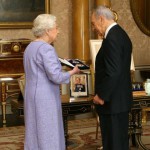
Shimon Peres and Queen of Great Britain Elizabeth II during Awarding with Order of St Michael and St George
According to his own words, Peres became interested in politics when he was fourteen or fifteen years old. At that time, the matter of ideological orientation of Jewish yeshiva – religious school, was on public agenda. Peres took sides with Ben-Gurion, who spoke against borrowing socialist ideas from Marx, Lenin, or Stalin; instead, he proposed to take them from the Tanakh – the written Torah, or the first five books of the Old Testament. Later Peres often remembered how at the age of sixteen he was Ben-Gurion’s fellow traveler, when the latter gave him a lift in his car from Tel Aviv to Haifa. They drove without speaking a word for almost the entire two hours, when Ben-Gurion suddenly declared that Trotsky was not a real politician. To Peres’ question, “Why?”, – Ben-Gurion answered and said that a true leader would not propose the policy of “neither peace, nor war,” but would make a decision to continue the war or make peace at any cost instead.
Peres entered a Youth socialistic group Ha-Noar ha-Obed (Working Youth). In 1940, from Ben Shemen he was sent as a delegate to the movement’s conference, and after he delivered a speech before the conference’s guests, to his own surprise, he was elected one of the twelve members of the secretariat. In the secretariat seventeen-year old Peres turned out to be the only supporter of Ben-Gurion, the other eleven members were left-wing Marxists-Leninists. In Peres’ opinion, he was chosen because of his low voice. Whatever the reason was, it gave a start to his political career. As early as in 1944, at the congregation of the Youth’s movement, Peres won the majority of the voices, and later became Ben-Gurion’s helper.
At the same time, Peres met with the spiritual leader of the Mapai party – Berl Katznelson, who noticed him. Soon Peres became a member of the Mapai, and in 1946 the party elected him as a delegate for the 22nd Congress of the World Zionist Organization, which was the first one after the Holocaust and World War II. When the creation of the Jewish State was discussed, the delegates preferred Ben-Gurion, who stood for the non-compromise struggle, including the armed struggle, for the independent state, to the Congress’ chairman – Chaim Weizmann, who called for the Jewish-Arab negotiations under the auspices of USA and Great Britain. Having lost, Weizmann left his post, and since no one was elected to fill his office, the world’s Zionist movement was virtually headed up by Ben-Gurion. In 1948, the Jewish State was created, and Ben-Gurion became its first Prime Minister.
While he was still in Ben Shemen, Peres joined the underground military organization Haganah, which after the creation of the independent state became the basis for the IDF (or Tzahal) – Israel Defense Forces. Peres was trained to handle weapons, but, according to the expert opinions, he never participated in Haganah’s operations. At the end of 1948, Peres began to work in the Ministry of Defense, becoming a helper of the general director of this department Levi Eshkol. According to some information, it was the prime minister, Ben-Gurion, who brought Peres in to work at the headquarters, but did not release him to serve in active military units during the Independence war of 1947-1948. At that time, Peres controlled the drafting of 17-year-old boys and girls from Youth Zionist organizations into the new Israeli army. In 1950, for several months he was a temporary commander of Israel’s Navy. According to some experts’ opinion, Peres never headed up the Navy, because the official commander of the Navy forces at that time was Paul Shuman. In the same year, Ben-Gurion ordered to send Peres to the United States, where the latter headed up Israel’s Defense Ministry representatives and studied at New YorkSchool of social studies and at HarvardUniversity. At the same time, it is also known that back in 1949, Peres did not know any foreign language.
When he returned from the United States in 1952, Peres became the acting general director of the Ministry of Defense, and later he was established in this office. Peres was able to gain control over the major part of the country’s budget, and laid foundation for the Israeli aviation, electronic, and defense industries; he also reorganized scientific research work in the military sphere. On top of that, he became the initiator of the Israeli atomic project’s realization. For the Suez campaign of 1956, the French government awarded Peres with the Order of Legion of Honour. According to some sources, in 1957 Peres proposed to rent the lands in French Guiana to build an Israeli colony there.
In 1959, for the first time Peres was elected to the Israeli Parliament (the Knesset). He became a member of the Fourth Knesset from the Mapai party that won the victory, and was appointed the Deputy Defense Minister. It is known that in 1961, Peres developed a project of the agreement, according to which West Germany would obtain a permission to create its military bases on the territory of Israel. In 1963, when Ben-Gurion left the position of the head of the government, new Prime-minister Levi Eshkol asked Peres to remain in the office of the Deputy Defense Minster.
In 1965, Peres without any hesitation left his position in the Ministry and came out of the Mapai party, when Ben-Gurion decided to come back into politics and created a new movement Rafi (Israeli Workers List). In July of 1965, Peres was elected the secretary of Rafi and engaged in organizational matters, public promotion and fund raising. Several months later, he was elected a member of the Sixth Knesset from Rafi.
Soon after the Six Day War in 1967, Rafi party together with Mapai party, and Ahdut HaAvoda were united into a new Avoda party (Labour Party), and Peres was elected one of its two secretaries. Peres became a member of the government again only in 1969, after the elections to the Seventh Knesset, first becoming a minister without portfolio, then – Minister of Immigrant Absorption, and starting from 1970 – Minister of Transportation and Minister of Communications.
After the Yom Kippur War in October 1973, Peres again was elected to the Knesset. In 1974, he first became Minister of Information, then – Israeli Defense Minister, receiving this office at the offer of his fellow party member and long time rival Yitzhak Rabin, who took the office of Prime Minister (later the cooperation of these two ambitious leaders grew into a hidden resentment). In the middle of the 1970s, Peres signed preliminary agreements with Egypt and opened a border crossing checkpoint at the border with Lebanon called Ha’Gader Ha’Tova.
In the office of Defense Minister, Peres was the organizer of the famous Operation Entebbe to free the Air France passenger hostages, captured by Palestinian and German terrorists on June 27 of 1976. The terrorists landed the airplane at Uganda’s EntebbeAirport, separated Israeli citizens and Jews from other countries from the rest of the passengers, and announced that they would kill the hostages if 53 of their accomplices would not be released from Israeli prisons. When the Israeli government was already willing to negotiate, Peres turned out to be the only one to speak against it, and he proposed to have a military operation instead. Israeli military came to Uganda and successfully freed the hostages. The only Israeli soldier who was killed was the commander of the operation – a brother of Benjamin Netanyahu.
In the same year of 1976, Peres for a while was the acting Prime Minister: Rabin resigned from office right after the publication in the press of the story of his wife’s dollar account in a foreign bank, which was not allowed by the law. Peres also replaced Rabin as the party’s leader, heading up the election list. In May of 1977, he was elected to the 9th Knesset, but Avoda lost the elections to the right wing party block Likud under Menachem Begin. Peres became a member of the Parliamentary committee of Foreign Affairs and Defense.
Gradually Peres was able to reconstruct and recover the party, demoralized by the defeat in the elections. He gathered around himself a team of young and loyal leaders. The Lebanese war, inflation, and subsequent resignation of Begin resulted in the early elections to the Knesset in July of 1984, when neither Likud, nor Avoda could gain the majority of the votes. Then the decision was made to form a coalition government: for the first two years Peres would take the office of the Prime Minister, and the leader of Likud – Yitzhak Shamir received the offices of Deputy Minister and Foreign Affairs Minister, then they changed places. Apart from that, until December of 1984, Peres took the offices of Minister of Religion and Interior Affairs Minister.
During his term as Prime Minister, Peres withdrew troops from Lebanon, leaving a “safety zone” for the protection of the northern border of Israel, and was able to bring down the inflation from 373 to 20 percent through strict economic measures. Also, Israel was able to restore diplomatic relationships with a number of countries in Africa and Eastern Europe, and regained US support. According to some experts, Peres’ success was achieved because of favourable conjuncture: sliding oil prices at the world markets, the dollar’s fall, and the war between Iran and Iraq.
In the fall of 1988, during the elections to the twelfth Knesset, Peres’ party had all the chances to win. But two weeks before the vote, there was a terrorist attack, and a woman with small children burned alive in a bus. Since traditionally terrorist attacks in Israel lead to the increased support of the right-wing parties, Likud and Avoda eventually formed a unity government again: Shamir became Prime Minister, while Peres – his deputy and Minister of Finance. In 1990, when Likud did not allow starting negotiations with the Palestinians through the mediation of the United States, Avoda left the government, Peres lost his offices, and again became a member of the parliamentary committee of Foreign Affairs and Defense. According to other sources, the resignation was caused by Peres’ attempt to take the seat of the Prime Minister. For that purpose he reached an agreement with religious parties and bribed several deputies, but his subtle scheme fell through and became a symbol of political sleaze in Israel.
In 1992, Rabin replaced Peres as Avoda’s leader, who promoted his candidacy in the party elections and won. At the same time, Peres managed to turn former hostility between them into cooperation. In June of 1992, Avoda under Rabin won the victory in the Knesset elections. Peres had the office of the Minister of Foreign Affairs in the government of Rabin.
After heading up the Foreign department, Peres began unofficial negotiations with Yasser Arafat, leader of Palestine Liberation Organization (PLO), the charter of which explicitly formulated the annihilation of Israel as one of its goals. Moreover, Peres did not even inform Rabin of the fact that the negotiations had started. In the beginning of 1993, at the Borregaard residence of the King of Norway near Oslo, secret Palestine-Israeli negotiations were started, and on September 13 1993, in Washington, Rabin and Arafat signed the Declaration of Principles. The sides agreed to create the Palestinian autonomy (allowing autonomy for the Gaza Strip and the city of Jericho, and introduction of the limited self-rule in the West Bank for a five-year interim period) in return for the Palestinians’ giving up their plans of destroying Israel.
In 1994, Peres received the Nobel Peace Prize for the activities that helped to reach Oslo Accords between Israel and PLO. According to some information, at first only Rabin and Arafat were nominated for the award, but after Peres threatened to rupture the agreements, the Nobel committee members made an exception of the rules, awarding all three of them. The peace Prize is the only one of the Nobel Prizes that is awarded not in Stockholm, but in Oslo, and its laureates are determined by a special committee that consists exclusively of Norwegians. According to some experts, the major factor in the awarding of Peres, Rabin, and Arafat was the fact that the negotiations were held specifically in Oslo. In several years, in 2002, the members of the Nobel committee made an unprecedented statement that they would have stripped Peres of the peace prize if they had such an opportunity. In their opinion, when he was a member of the Cabinet of Ministers, Peres did not take any measures to prevent the new occupation of the Palestinian territories by Israel.
Peres’ activity in the office of the Israeli Foreign Affairs Minister was not limited only to the accords with PLO: he signed a peace treaty with Jordan, started negotiations with Syria, and significantly improved relationships with other Arab countries.
In November of 1995, after the assassination of Rabin, Peres headed up the government and became Israeli Defense Minister. In May of 1996, in the first direct elections of Prime Minister, Peres, who was expected to win, lost to the leader of Likud – Netanyahu. In June of 1997, Peres stepped down from the post of Avoda’s leader; and the new party leader was Ehud Barak. Peres remained a member of the Knesset, and member of the parliamentary committee of Foreign Affairs and Defense, and in May of 1999, he was again elected to the Parliament.
In the summer of 2000, Peres participated in the presidential elections in Israel. On the eve of the vote, he was confident that his candidacy would be supported by no less than 66 of the 120 deputies of the Knesset. But on July, 2000, Peres received only 57 votes and lost to the candidate form Likud – Moshe Katsav, who had 63 votes. According to some information, during the secret vote some of the Knesset members, who had previously publicly stated that they would vote for Peres, in reality voted for Katsav.
In 2001, Peres again was included in the coalition government of Ariel Sharon, and until the end of 2002 he had the office of Deputy Prime Minister and Minister of Foreign Affairs. In October of 2002, because of discrepancies with Likud, Avoda left the unity government of Sharon, causing the governmental crisis and new elections. In the beginning of 2003, Peres was elected into the sixteenth Knesset. Avoda then suffered an overwhelming defeat from Likud, receiving only 19 mandates, that is, exactly two times less than the winner. But in summer of 2003, two weeks before his jubilee, Peres became Avoda’s leader for the third time.
In January of 2005, after some long party discussions, Avoda led by Peres joined Sharon’s coalition government again, fully supporting Prime minister’s decision of Israeli unilateral withdrawal from the Gaza strip. In the government, Peres received the office of Deputy Prime Minister. At the end of 2005, because of the inner party split, caused by the decision of unilateral delimitation, Sharon left Likud and founded a new party – Kadima, which was soon headed up, because of the sudden illness of the Prime Minister, by Ehud Olmert. The following governmental crisis led to the election of the new Avoda party leader, when the admitted favourite Peres lost the victory to the trade union leader Amir Peretz. Some time later after the defeat, Peres left Avoda and became a member of the Kadima party.
In April of 2006, Peres was elected to the Knesset from Kadima, and in May of 2006, he was given in the government of Olmert the roles of Vice Prime Minister and Minister of Development of Galilee and Negev.
Experts named Peres one of the possible candidates for the presidency in Israel in case of Katsav’s resignation. In summer of 2006, several women accused the latter of sexual harassment, coercion to cohabitation, and even rape. On January 25 of 2007, Katsav temporarily resigned as the head of the state, and Dalia Itzik became the acting President of Israel. On April 22 of 2007, the Knesset members extended the term of Katsav’s temporary suspension, until his presidential term was over. The election of the new President was to be held no later than June 14 of 2007.
On June 17 of 2007, Peres was elected the President of Israel. In the first round of the elections he received 58 of 120 votes of the Knesset members. Likud’s candidate Reuven Rivlin received 37 votes of support, and Colette Avital from Avoda got only 21 votes. Soon after the vote, both Peres’ contenders withdrew their candidacies and refused to continue running for the office of the head of the state. In the second round, 86 Knesset members voted for Peres who ended up being the only candidate. Being elected into the office of the country’s president (who mainly fulfills representative functions) became nearly the only success Peres had during all the time when he participated in Israeli elections since the late 1970s.
In December of 2008 – January of 2009, Israel conducted military operation Cast Lead in the Gaza strip, directed against Hamas movement that seized the power in the region; as the result of the operation, according to some sources, 1 300 Palestinians were killed.
In January of 2009, Peres participated in the World Economic Forum in Davos, where during one of the sessions he explained Israel’s position in the Gaza conflict. His emotional speech ended with applause from the rest of the audience. But this speech became one of the causes of a conflict episode with Turkey’s Prime Minister Recep Tayyip Erdoğan, whose answering speech was interrupted by the conference host, a journalist of The Washington Post. Erdoğan became indignant with such an attitude, and he left the conference.
Kadima party won the victory in the Knesset elections in February of 2009, getting 28 seats out of 120, Likud got one seat less. But Avigdor Lieberman, the leader of Yisrael Beiteinu party (Israel Our Home), that was third in the elections (15 mandates out of 120), spoke for the coalition government under Netanyahu, proposing to include into it the representatives of Kadima. Livni turned down this proposal. Nevertheless, on February 20 of 2009, Peres proposed Netanyahu for the Prime Minister of the country, allowing him the opportunity to form the coalition in 28 days. The new government under Netanyahu, which included representatives of the right-wing parties Likud, Israel Our Home, and Shas, and left-centrist Avoda, swore into office on March 31 of 2009.
In November of 2008, the Queen of Great Britain Elizabeth II honoured Shimon Peres with the title of the Knight of the British Empire and handed him the Knight Grand Cross of the Order of Saint Michael and Saint George (GCMG) that was traditionally awarded as the recognition of the services in the sphere of international relationships.
Peres is married, he has three children and six grandchildren. He met his wife Sonya back in Ben Shemen: in order to impress his future wife, he quoted The Capital by Carl Marx to her. In 1945, they got married. Peres’ daughter – professor Tsvia Walden has been trained in psycholinguistics; she specializes in speech psychology and gives lectures to the teachers of specialized schools. His elder son – Jonathan is an agronomist and veterinary; he established a school, where guide dogs for the blind are prepared and trained. The younger son – Nehemia (Chemi) is a former pilot; later he engaged in business, becoming the head of the investment fund Pitango venture capital.
According to Peres, the world for him divides into two parts – his friends and the books. At the age of nine, he started to write poems. The parents sent their son’s works to a famous Jewish poet – Hayim Nahman Bialik, who answered and in his letter praised the child’s talent. When he already was in Israel, his series of sketches under the title “From a Woman’s Diary” were published under a female pseudonym: critics then stated that “at last, in the Hebrew language literature a strong and pure female voice is sounding.” Peres wrote several books, The Next Step, 1965, David’s Sling, 1970, Entebbe Diary, 1991, The New Middle East, 1993, and Battling for Peace, 1998.
Apart from that, he is the author of numerous translations – for example, of Vladimir Nabokov’s works. Peres speaks English and French, and understands Russian.
More than once Peres emphasized that he considers himself to be a man of the future whom his contemporaries may not be able to understand. He stated that he believes in futurology, and not in history. According to him, it is more important not to remember the past, but to be able to dream and fantasize. At some point, Peres removed from office military surveillance advisers claiming that he could not discover among them “specialists in future.” According to some expert opinion, all his political defeats Peres explained by the fact that he was ahead of his time.
This material is taken from the web-resource: http://www.nobeliat.ru
Один комментарий
Leave a Comment
You must be logged in to post a comment.

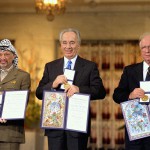
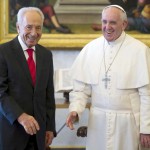
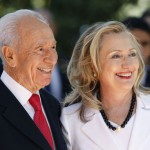
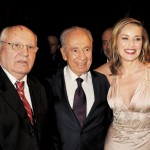
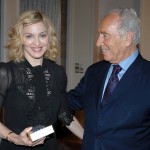
Очень интересно. Одно уточнение – ТАНАХ включает 5 книг Торы + Писания + Пророков.